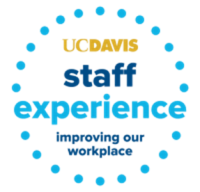Enhancing the workplace experience, one conversation at a time
Experience Conversations are 1:1, broad-ranging conversations between employees and managers, focused on understanding and enhancing the overall UC workplace experience.
UC Experience Conversations are recommended to be held at least once a year. The conversations are encouraged, though optional, and ask both managers and employees to discuss a few questions of their choosing. A form of “stay interview,” UC Experience Conversations surface dialogue and action planning via a wide range of topics of importance to the employee, such as:
- Overall job experience
- Retention
- Wellbeing and work-life integration
- Career development
- Inclusion and belonging
- Manager support
These conversations can be included as part of ongoing 1:1 conversations between managers and employees, and are a valuable way for managers and employees to discuss new or shifted career aspirations and provide employees with an opportunity to discuss areas of importance to them.
Toolkit and Additional Resources
FAQ
- 1. Who can take part in a UC Experience Conversation?
- The design of UC Experience Conversation is to facilitate a two-way conversation between managers and employees. These conversations are not just for high potentials, successor candidates or flight risks. UC Experience Conversations should be offered to everyone on a team if the conditions for a successful conversation are in place.
- 2. Are UC Experience Conversations part of a performance evaluation?
- UC Experience Conversations are not considered evaluative conversations, though they can be used as an approach to take future employee planning conversations to a deeper level.
- 3. How often should employees and supervisors or managers hold these conversations?
- The best practice is to offer the conversation as part of a regularly scheduled 1:1. These questions can be revisited or discussed at any time and you do not have to stick to only discussing these types of open-ended questions once per year.
- 4. Can a supervisor or manager require that an employee engage in a UC Experience Conversation?
- Employee consent is a must, so it's important that employees feel completely comfortable having the conversation. Talk to employees first and use the template for managers to invite employees to the conversation. The template also includes details on preparing and following up. If there are any organizational, relational, or personal factors that would prevent a productive dialogue, it is recommended to offer the conversation at a different time when conditions are better. We encourage employees who are reluctant to participate to address their concern with their manager. Employees can always reach out to their manager’s manager to express concern as needed.
- 5. Can an employee initiate a conversation by providing this website and toolkit to their supervisor?
- Absolutely! Employees and supervisors alike can work to initiate UC Experience Conversations. Employees are encouraged to share this resource with their supervisor or manager.
- 6. What if an employee reports to multiple managers?
- If an employee reports to multiple managers, check with the employee on their preferences for meeting with their managers together or separately.
- 7. How can leadership help support the utilization of this toolkit?
- While these are 1:1 conversations between employees and managers, leaders are encouraged to work with managers to explore conversation themes, trends, concerns and opportunities at the organizational level, in addition to doing their best to support managers' follow-through on key actions with employees. Organizational leaders should also consider gathering employees' insights on the UC Experience Conversation process as well.
Additional Resources for Employees
Additional Resources for Managers
- Career Advancement Decision Tree — 2021 Southern California UC-Coro Systemwide Leadership Collaborative
- Talent Planning Worksheet — 2021 Southern California UC-Coro Systemwide Leadership Collaborative
- Career Advancement Scenarios — 2021 Southern California UC-Coro Systemwide Leadership Collaborative
- Wellness in the Hybrid Workplace — 2021 Northern California UC-Coro Systemwide Leadership Collaborative
UC Davis Campus managers: Using this toolkit with your employees can be an important next step to act on your Staff Experience Survey results. The question topics in the toolkit span many areas addressed by the survey: Belonging, Career, Empowerment, Feedback, Intent to Stay, Speak My Mind, etc.
